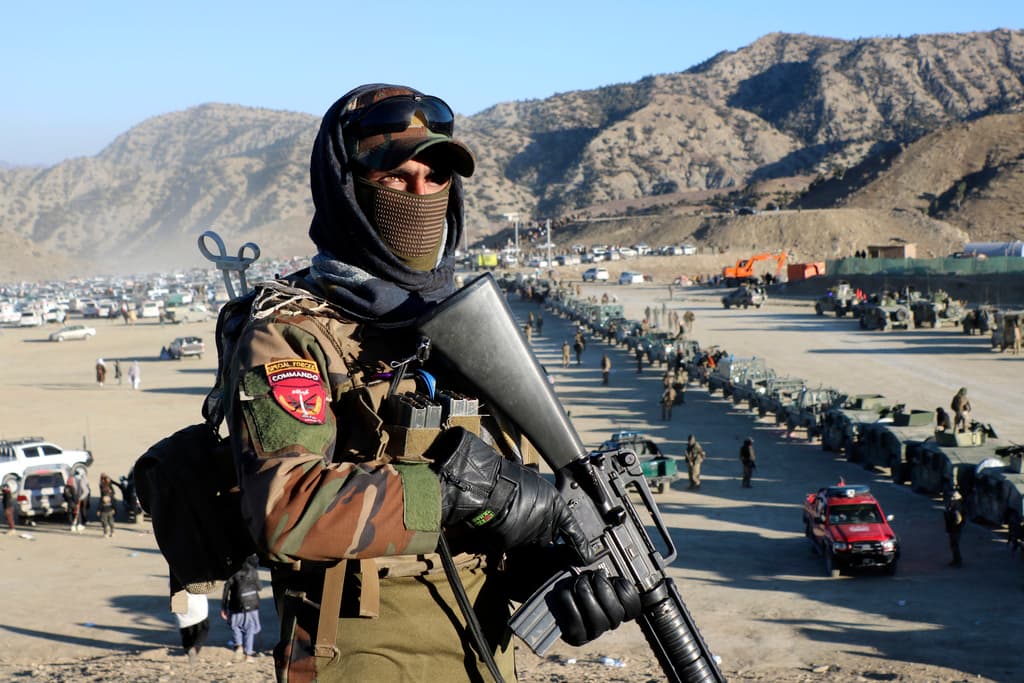With Islamist Terrorism on the Rise in Afghanistan and Foes Such as Communist China Gaining Power There, America May Need To Pivot
While the end of America’s involvement in the south Asian country known as the ‘graveyard of empires’ has been celebrated, Washington does not want to repeat the mistake of simply turning its back on Afghanistan.

While President Biden’s disastrous withdrawal from Afghanistan complicated his entire foreign policy effort, it is at least seen as an end of America’s involvement in the south Asian country known as the “graveyard of empires.” Yet, the region is an Islamist terrorism hotbed, raising the question of whether we are paying enough attention as battles escalate there.
The Taliban chased away the globally recognized Afghan government soon after the infamous August 2021 scenes of American withdrawal at the Kabul airport. Now, the group that once gave a home to Al Qaeda is engaged in war with its former patron, Pakistan. The Taliban are also fighting the Islamic State’s Khorasan group, known as ISIS-K.
Navigating the situation could be too complex for outsiders in a country where it’s difficult to tell friend from foe. Both Presidents Trump and Biden sought to end the war that America waged in the immediate aftermath of the September 11, 2001, terrorist attacks. America, for now, seems to have concluded that forging alliances in south Asia is someone else’s job.
Withdrawing from Afghanistan “actually strengthened our position around the world,” the outgoing secretary of state, Antony Blinken, told the New York Times last week. “Our adversaries would like nothing more than for us to have remained bogged down in Afghanistan for another decade.”
In reality, Communist China is making inroads to Afghanistan, where the Taliban are auctioning mine leases for valuable minerals such as gemstones, gold, copper, iron, and chromite, the Times reported Monday. Beijing is gaining most of the mining contracts via its Belt and Road Initiative; Russia and the Islamic Republic of Iran are also getting pieces of the pie.
Yet, at least the withdrawal ended what was seen in Washington as one of America’s endless wars. “The fact that we will not have another generation of Americans fighting and dying in Afghanistan, that’s an important achievement in and of itself,” Mr. Blinken said.
“If it’s meant literally, I would agree,” a former American ambassador to Afghanistan, Zalmay Khalilzad, tells the Sun. “We would not go back for an extended effort with ambitious goals to change that society.”
Yet, he adds, “one can’t exclude with absolute certainty some kind of conflict such as, God forbid, if another terrorist attack were traced to Afghanistan. I don’t see this happening in the near future, but long term, there’s greater uncertainty.”
The Afghan-born Mr. Khalilzad, who also served as ambassador to Iraq and the United Nations, was the top negotiator in clandestine talks that led to the February 2020 Doha Agreement between the Taliban and America. Trump hoped it would end all involvement in Afghanistan, and the pact served as blueprint for Mr. Biden’s withdrawal.
With conditions in the country now becoming more complex, though, “you need to monitor the situation, not turn our back,” Mr. Khalilzad says. “We made a mistake after the Soviet withdrawal from Afghanistan. We turned our back, didn’t monitor what was unfolding there until it was too late.”
Mr. Biden’s top hostage negotiator, Roger Carstens, recently traveled to Doha to negotiate a deal with Taliban officials to release three Americans believed to be held in Afghanistan, the Wall Street Journal reports Tuesday. The deal would free the Americans — George Glezmann, Ryan Corbett, and Mahmoud Habibi — in return for a senior Al Qaeda aide, Muhammad Rahim al Afghani, who is held at the Guantanamo prison.
Beyond such exchanges, though, is America paying enough attention to deadly skirmishes on the Afghani-Pakistani border, or to the growing tensions between the Taliban and ISIS-K as well as other terrorist groups?
A senior Taliban official, Khalil-Ur-Rahman Haqqani, was killed by an ISIS-K suicide terrorist driving a car bomb at Kabul last month. The Taliban, for now, are fighting groups that seek to harm America. Yet it’s their own interests, rather than America’s, that are driving that fight. Whether they will eventually find ways to join arms with the terrorists remains to be seen.
Meanwhile, the Pakistani army killed more than 900 “terrorists” in 2024, its spokesman, Lieutenant General Ahmed Sharif Chaudhry, said last month, according to Bloomberg. Islamabad is fighting the Taliban’s Pakistani branch, known as TTP.
The Taliban in Afghanistan, which were once supported by the Pakistani intelligence, are now attacking Pakistani soldiers on the border between the two countries, in an increasingly bloody war. ISIS-K and other terror groups that fight the Taliban in Afghanistan are reportedly now seeking refuge in Pakistan.
For America, the Pakistanis have been “both an enemy and a friend at the same time,” Mr. Khalilzad says. “And the Talibs are taking a page from that playbook, it seems to me, doing to the Pakistanis what the Pakistanis did to us: They are supporting their brethren, the Pakistani Taliban, while denying that they are doing it.”

